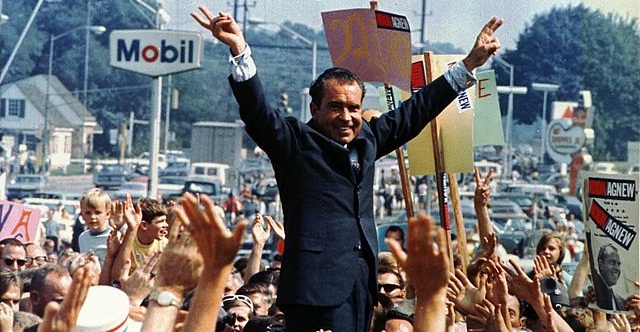 Movies and TV
Movies and TV  Movies and TV
Movies and TV  History
History 10 Things You Never Knew About Presidential First Ladies
 Movies and TV
Movies and TV 10 Zombie Movies That Will Actually Terrify You
 Humans
Humans 10 Times Scientists Were Absolutely Sure… and Absolutely Wrong
 Our World
Our World 10 Pivotal Moments for Life on Earth
 Movies and TV
Movies and TV 10 Most Realistic Medical TV Shows of All Time
 Creepy
Creepy 10 Eerie & Mysterious Ghosts of the Pacific Coast
 Weird Stuff
Weird Stuff 10 Typos That Accidentally Changed History
 History
History 10 Times Trickery Won Battles
 Technology
Technology 10 Awesome Upgrades to Common Household Items
 Movies and TV
Movies and TV 10 Movie Flops That Found Their Way to Cult Classic Status
 History
History 10 Things You Never Knew About Presidential First Ladies
 Movies and TV
Movies and TV 10 Zombie Movies That Will Actually Terrify You
Who's Behind Listverse?

Jamie Frater
Head Editor
Jamie founded Listverse due to an insatiable desire to share fascinating, obscure, and bizarre facts. He has been a guest speaker on numerous national radio and television stations and is a five time published author.
More About Us Humans
Humans 10 Times Scientists Were Absolutely Sure… and Absolutely Wrong
 Our World
Our World 10 Pivotal Moments for Life on Earth
 Movies and TV
Movies and TV 10 Most Realistic Medical TV Shows of All Time
 Creepy
Creepy 10 Eerie & Mysterious Ghosts of the Pacific Coast
 Weird Stuff
Weird Stuff 10 Typos That Accidentally Changed History
 History
History 10 Times Trickery Won Battles
 Technology
Technology 10 Awesome Upgrades to Common Household Items
10 Reasons Richard Nixon Was Secretly An Amazing President
Even if you just think he’s a character on Futurama, you’ve probably heard of Richard Nixon. The 37th president of the United States was a crook, a liar, and a raging anti-Semite. He deliberately sabotaged the Vietnam peace process, launched the expensive failure known as the War on Drugs, and famously ordered his goons to try to burgle the Democratic Party’s headquarters. Oh, and he did all this while being one of the greatest presidents the US has ever known.
10 Creating The EPA

Thanks to two decades of left and right clashing over global warming, we are now at the point where it’s impossible to use the words “Republican” and “environmentalist” in a sentence without either bursting into laughter or wanting to weep. Modern political logic dictates that the Democrats are the wishy-washy party of the environment, while the GOP are the party of big oil, logging companies, and clubbing baby seals (probably).
But 40 years ago, things were very different. Back then, a Republican president could also be the biggest tree-hugging hippie the Oval Office had ever known. In 1970, Nixon became probably the only president in history to whip up cross-party support for new measures designed to save the environment.
Aside from setting up the EPA to stop companies chucking their radioactive waste down the toilet and whatnot, the Nixon administration also pushed through the National Environmental Policy Act—known today as the “Magna Carta of the environment.” It’s thanks to this nifty piece of legislation that you’re not reading this from the middle of a Brazil-style nature wasteland and that no one can drive a new interstate over your lawn without a very good reason.
9 Ending The Draft

Richard Nixon has something of a reputation as a warmonger, thanks to his penchant for, well, war. While it’s true that his administration committed atrocities in Vietnam and orchestrated a violent coup in Chile, he did make one important contribution to peace: He was the president who finally ended the draft.
Now, thanks to stuff like the GI Bill, the draft did some pretty great things for certain recruits. On the other hand, it also sent them to far-off countries to be blown to bits in futile wars—a downside that pretty heavily outweighed the plus points. In one form or another, it had been operating since World War II—until the Nixon administration eliminated it in 1973.
Apparently, Tricky Dicky felt a volunteer fighting force would be more motivated than one made up of recruits—although there is a school of thought that suggests he gambled on opposition to the Vietnam War waning when rich kids were no longer forced to go die in Asia. Whatever his motives, you can thank Nixon for the fact that you haven’t spent the last few years traipsing around some godforsaken corner of Afghanistan.
8 The War On Cancer

The War on Terror, the War on Drugs—modern history is full of unofficial “wars” that have done nothing more than sap the national budget and kill a lot of people. But there is one exception: The War on Cancer has by any measure been a resounding success.
Despite failing to find a blanket cure—if such a thing even exists—federal funding for cancer treatment programs has seen cancer death rates plummet over the past 40 years and detection rapidly improve. So, given that you already know the premise of this article, want to guess who launched this cancer-smashing medical assault?
Richard Nixon got the ball rolling just in time for Christmas 1971, signing into law the National Cancer Act on the 23rd of December. The new law plowed federal funding into cancer research and is the reason why survival rates are currently sky-high. It may not have been as headline-grabbing as the failed War on Drugs, but the War on Cancer has been an unabashed success.
7 Smashing The Deficit

In these dark times when federal budget deficits frequently roam around the $1 trillion mark, most Washington officials would probably sell their mother for a deficit of only $23 billion. But make no mistake—to the Nixon administration, this was a terrifyingly large number. So large, in fact, that Nixon was prepared to do something unthinkable to a modern-day Republican—he declared himself a Keynesian in 1971, and unleashed a bag of economic tricks so overwhelmingly liberal it would make Obama blush.
The New Economic Policy changed the course of history. It combined massive stimulus designed to increase employment with an uncoupling of the dollar from the Bretton Woods exchange system, essentially eliminating the link between the dollar and gold. The knock-on effect of this has been enormous. It’s the reason why we didn’t go through a devastating crash in 1987 and one of the reasons we’re in recession now.
This “Nixon shock” managed to knock around $17 billion off the deficit in three years. Imagine the praise Obama would have received for sweeping away 70 percent of the deficit in under one term, and try to argue that Nixon doesn’t deserve more credit for this.
6 Guaranteed Health Care

Speaking of Nixon’s liberal credentials—it’s only by a tiny margin that your grandparents weren’t getting all worked up about “Nixoncare” in 1974. That’s right—32 years before Romney did it, and 34 years before Obama stole Romney’s idea (and somehow made him campaign against it), Nixon was trying to ensure affordable healthcare for the entire US population.
Just like Obamacare, his system would have utilized private employer-sponsored insurance, while extending subsidies to those too old or ill to work. And just like Obamacare, it would have stayed out of the regulation game with hospital budgets. It was a hugely popular move on the administration’s part and fellow Republicans absolutely lapped it up. In fact, the only reason it didn’t pass was that the Democrats thought it wasn’t liberal enough and voted against it. That’s the exact same policy they later expended lots of political capital forcing into law, while the Republicans who dreamed it up destroyed themselves fighting against it. It’s a weird world we live in.
5 A Guaranteed Income

In 1969, Washington came within an inch of unleashing one of the most game-changing economic plans ever devised. Under a Nixon administration proposal, all families with children were to be guaranteed an income sent by check each month, no questions asked.
Simply put, this could have changed everything. Families in the notoriously welfare-stingy South would have been catapulted out of poverty. Those in the more generous North would have suddenly gained an incredible degree of autonomy, allowing them to sink or swim away from the rigid confines of the welfare system.
Admittedly the amount wasn’t very large—about $15,300 per year in today’s money—and Nixon could never convince enough right-wing reactionaries or woolly liberals to vote for it. But still, it was probably the single most radical welfare shakeup an American president had devised since the creation of welfare, and for six months in 1970, it looked almost guaranteed to pass. How would life be different for our modern poor if Nixon had gotten those all-important votes? We can only speculate.
4 Lowering The Voting Age

It’s the standard argument from those who want the drinking age lowered: How can it be right that I’m old enough to die for my country, but not old enough to enjoy a beer? Well, as CNN pointed out, that insane logic applied to something more fundamentally important than even alcohol until 1971: the right to vote.
Prior to the Nixon administration, you could legally drive a car, live on your own, and get sent to Vietnam to die an agonizing death without ever being allowed a say in who ran the country. That all changed with the 26th Amendment, a law Nixon not only signed but championed all the way.
Thanks to our modern image of all young people in the ’60s being Democrat-voting hippie protesters, this almost seems counter-intuitive. However, Tricky Dick really believed that lowering the voting age would make American democracy healthier, more robust, and basically better. And you know what? The old swindler was right.
3 Affirmative Action

Affirmative action is one of those things people nowadays get pretty worked up about, but in the ’70s, it was an absolute necessity. The civil rights movement had prevailed, but vast swaths of the US were still bitterly divided, with racists refusing to hire black people and certain local governors doing seemingly all they could to whip up interracial tension. There was no doubt that something needed to be done, and in 1969, Nixon took the first small step towards doing it.
By today’s standards, his Philadelphia Plan seems almost laughably weak. Restricted entirely to the construction industry and test-run in a single city, it basically set up hiring quotas businesses had to make a “good faith” effort to comply with. In other words, they didn’t even have to hit their targets—they simply had to make a bit of an effort to be less institutionally racist.
But at the time, it was like dropping dynamite into a hornet’s nest. People protested. Insults were hurled. Construction firms even tried to have the plan declared illegal, ironically using a minor clause in the 1964 civil rights legislation. By the ’70s, though, the plan was in place—probably the first example of affirmative action in US history. Not bad going for a racist tool.
2 Gender Equality

It wasn’t just ethnic minorities that got short shrift in the past. Women were still treated with the level of disdain usually reserved for the stuff you find growing between your toes, and there was nothing to prohibit federal programs from discriminating against someone purely on the basis of their genitals. Although this state-sanctioned sexism manifested itself in all sorts of dumb and unpleasant ways, it was most acute in the field of sport. There was almost no funding available for women’s sports teams prior to 1972—then Title IX came along and changed everything.
Signed into law by Nixon on June 23, 1972, Title IX made it illegal for federally funded education programs to discriminate based on sex. That may sound kinda dull, but its effects were nothing short of epoch-shaking. According to The New York Times, the number of women playing sports in high school and college before Title IX was 310,000. Fast-forward to the 21st century, and it’s over three million. That’s an almost-silly increase, the result of which includes an awesome female athletics team that routinely sweeps the board at the Olympics. In short, Title IX allowed everyone to benefit.
1 Desegregation

We covered a moment ago how Nixon was kind of a massive racist, even by the lamentable standards of the times. But even he had nothing on some of the Southern states. By 1970, seven states still enforced segregated schooling—a move that broke two Supreme Court rulings and seemed to set the states on a collision course with the rest of the Union.
It seems impossible to imagine now, but back then, it seemed like something as simple as equality might really spark off a kind of guerrilla civil war. People were predicting riots—blood flowing through the streets, children murdered on their way to school. In short, it could have been a humanitarian disaster. Then Nixon stepped in.
Along with a cabal of close advisers, America’s most lamented president met with legislators from all seven Southern states, even traveling down to Louisiana to allay people’s fears. Over several months, he did everything in his power to make sure segregation would not only be stamped out, but that it’d die peacefully—and it worked. Segregation vanished in education and not a drop of blood was spilled. According to The New York Times, closet-racist Nixon probably did more for desegregation than all previous administrations combined, and he did it without sending the country spiraling into civil war.
In short, the 37th president wasn’t all bad. Whether this makes up for his myriad failings is another matter entirely.








